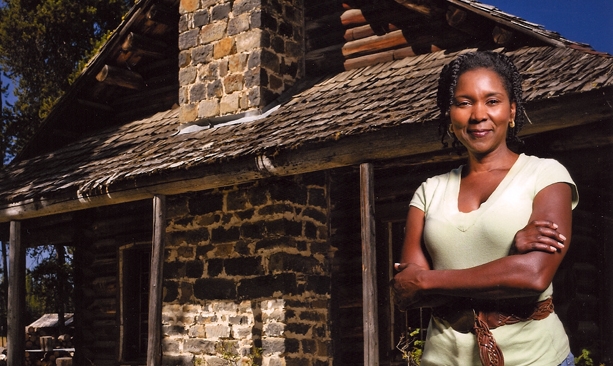
Growing up in La Grande in the 1960s, Gwen Trice always loved the beauty of nearby Wallowa County. But she only recently discovered just how deeply her family is rooted there.
During a transition in her professional life in 2001, she began going home to visit more often. People started telling her stories about her father, Lucky, who had passed away when Trice was 21, and his connection to a tiny logging town called Maxville that once existed near Wallowa.
From 1923 to the early 1930s, Maxville operated as a company town for a Missouri lumber company. Among its households were more than 50 African Americans from southern states who’d been recruited to work in the woods of Wallowa County. Lucky’s family was one of them.
Lucky was 56 when Trice was born. She’d never heard about his life as a young man, which was not only personally interesting, but historically significant. “[The story] is part of rural Oregon that’s so phenomenal. It’s wonderful that this is a part of my history,” Trice says.
Maxville was one of the most culturally diverse Oregon towns of its time — with black and white southern transplants as well as Greek immigrants and white Oregonians. The town saw segregation enforced by the southern company that owned it. It had the only segregated school in Oregon, divided working conditions and even two baseball teams.
Despite all of that, Maxville was a place where cross-cultural friendships flourished. Former residents told Trice how people came together to survive the tough natural environment and bonded because of it. “They had lifelong friendships. They were able to shrug off the constraints of this caste system.”
The story of Maxville captured her heart, especially after national African American historians told her they’d never heard of the role blacks played in American logging. In 2006, she began speaking about Maxville and working to develop the center. (Among other attention, Trice was the subject of a 2009 Oregon Public Broadcasting documentary called “The Logger’s Daughter.”) The Maxville Heritage Interpretive Center received its official nonprofit status in 2010, and Trice is executive director. The center seeks to preserve the rich history Maxville and other similar communities in the Pacific Northwest.
In its home in downtown Joseph, the center offers a view into the past with displays of artifacts, photos of loggers, horses and equipment, a replica baseball uniform and a map of the town plotted with the houses and the names of the families who lived there. The center will eventually have a permanent home in a nearby former U.S. Forest Service compound built in the 1930s.
You can visit Wednesday through Sunday, or take part in the Maxville Annual Gathering, a family-friendly event that celebrates the logging history of Wallowa County, in the summer.
As for Trice, she continues to garner support for the interpretive center in order to help share the story of Maxville and this unique piece of Oregon history. “It becomes a more rich story and tells us where our culture comes from,” she says. “My culture doesn’t come from the color of my skin. It comes from the place I live and call home.”
The Oregon Commission for Women awarded Trice the Oregon Women of Achievement, an honor given by the Oregon Commission for Women in recognition of “leadership and success in promoting the status of women in society, reflecting a commitment to equity and diversity, and serving as exemplary role models.”
Editor’s Note: To lean more about the Oregon’s African American heritage, stop by the Oregon Historical Society’s All Aboard: Railroading and Portland’s Black Community, an exhibit that focuses on the work and lives of African American railroad workers in Portland in the 1800s to 1940s.


